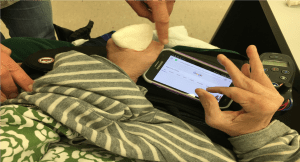A desire to make it easier for his grandparents to prepare their own meals motivated Lamar Pi to design MODU, a customizable tray and accessory set that attaches to walkers or wheelchairs to give people with limited mobility a stable work surface and accessible storage space.
“They’re unable to stand up for long periods of time and transporting objects around the home is a challenge,” said Pi, an industrial design student at San Francisco State University, of his otherwise-active grandma and grandpa.
The portable prototype, inspired by a service trolley, a Japanese bento box and outdoor cookware, earned the top prize in USC Leonard Davis School of Gerontology’s Morton Kesten Universal Design competition, an annual contest that challenges students across the country to come up with products or spaces that can help people of all ages and abilities to live comfortably at home.
AARP reports that nearly 90 percent of people over age 65 want to stay in their home for as long as possible. Employing principles of universal design can help make that a reality, says Jon Pynoos, UPS Foundation Professor of Gerontology, Policy and Planning at the USC Leonard Davis School and one of the competition’s judges.

Zoe Logan of NYU earned second place for Handled!, a set of assistive kitchen tools.
“The majority of homes were not built with people of all ages, sizes, and abilities in mind,” said Pynoos. “Universal design features and products can play a critical role in the ability of all individuals to conduct their daily activities, age in their homes, and avoid institutional settings.”
Wider doorways, pull out cabinet shelves and varied countertop heights are all examples of universal design in the home. Pynoos says that professionals are increasingly creating designs and products that support all ages and stages of life.
The goal of the USC Leonard Davis School’s Kesten competition is to inspire future designers to contribute to this growing trend. Now in its third year, the contest has expanded from a statewide to a national event.
Zoe Logan of NYU earned second place for Handled!, a set of assistive kitchen tools to empower differently abled users to have better access to the pleasure of cooking. This series includes a stabilizing cutting board and adaptive modular handles for enhancing existing kitchen utensils like spoons and spatulas. Third place was awarded to a team of students from Mount Ida College for grip.ABLE, a smartphone case with an attached handle to allow individuals with various levels of dexterity to grip the case.
The team of judges included Mary Lou Dauray, an environmental artist and advocate for inclusive spaces and universal design; Adley Chan, assistant professor in the USC Chan Division of Occupational Therapy and Occupational Sciences; and Jordana Maisel, director of research activities at the University at Buffalo Center for Inclusive Design and Environmental Access and adjunct assistant professor at the University at Buffalo. Maisel was also a speaker at the recent USC Morton Kesten Summit.
The USC Leonard Davis School’s biannual Morton Kesten Summit and yearly Universal Design Competition address the needs of individuals aging in place and are endowed by a family member in memory of the late Morton Kesten, an executive of Colonial Penn Insurance Company at the time it was servicing AARP.

A team of Mount Ida College students earned third place for grip.ABLE, a smartphone case for individuals with dexterity challenges.
In addition to how well they utilized universal design principles, competition entries were evaluated on criteria including how well they filled a market gap, how they looked and functioned, and how feasible and cost-effective they would be to produce. The top three winners received $1,500, $1000 and $500, respectively.
Top prize winner Pi plans to continue to refine MODU and hopes to see his prototype become an actual product.
“As I grow older, I’ve watched my grandparents grow older,” said Pi. “The market lacks a viable solution for those who would want to stay active and independent in the household.”
The hope is that good designs like MODU and the other entries will become key ingredients in making aging in place more possible.
Details for the 2017 Morton Kesten Universal Design Competition will be posted on the competition website, https://gero.usc.edu/udcompetition/, in the near future.
Above: Lamar Pi’s first-place design MODU, a customizable tray and accessory set.





